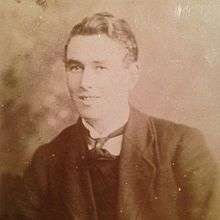Frank Potter
For the Australian politician, see Frank Potter (politician).

Frank Potter
| Frank Potter | |
|---|---|
| Born |
1891 Duleek, Co. Meath, Ireland |
| Died | 11 September 1917 (aged 25–26) |
| Buried at | Communal Cemetery Extension, Bailleul, Nord, France (50°44′16″N 2°44′35″E / 50.73778°N 2.74306°ECoordinates: 50°44′16″N 2°44′35″E / 50.73778°N 2.74306°E) |
| Allegiance | United Kingdom |
| Service/branch | British Army |
| Rank | Sergeant |
| Unit | No. 20 Squadron RFC |
| Battles/wars |
World War I • Western Front |
| Awards | Military Medal |
Sergeant Frank Potter (1891 – 11 September 1917) was a British World War I observer who became a flying ace, being credited with seven aerial victories.[1]
Military service
In 1917 Potter was serving in No. 20 Squadron RFC, flying in the Bristol F.2b fighter. He gained his first victory with pilot Lieutenant N. V. Harrison on 16 June, driving down out of control an Albatros D.III north east of Ypres. His six following victories were all over Albatros D.Vs, between 29 June and 28 July, and were shared with pilot Lieutenant Harold Joslyn.[1]
Potter was wounded on 5 September,[1] eventually succumbing to his injuries on 11 September 1917. He is buried in the Communal Cemetery Extension, Bailleul, Nord.[2]
References
- 1 2 3 "Frank Potter". The Aerodrome. 2015. Retrieved 25 September 2015.
- ↑ "Casualty Details: Potter, Frank". Commonwealth War Graves Commission. 2015. Retrieved 25 September 2015.
This article is issued from Wikipedia - version of the 4/27/2016. The text is available under the Creative Commons Attribution/Share Alike but additional terms may apply for the media files.